NCAA Men’s Championships: Texas vs. Cal – Part 11; A Look At Top Matchups
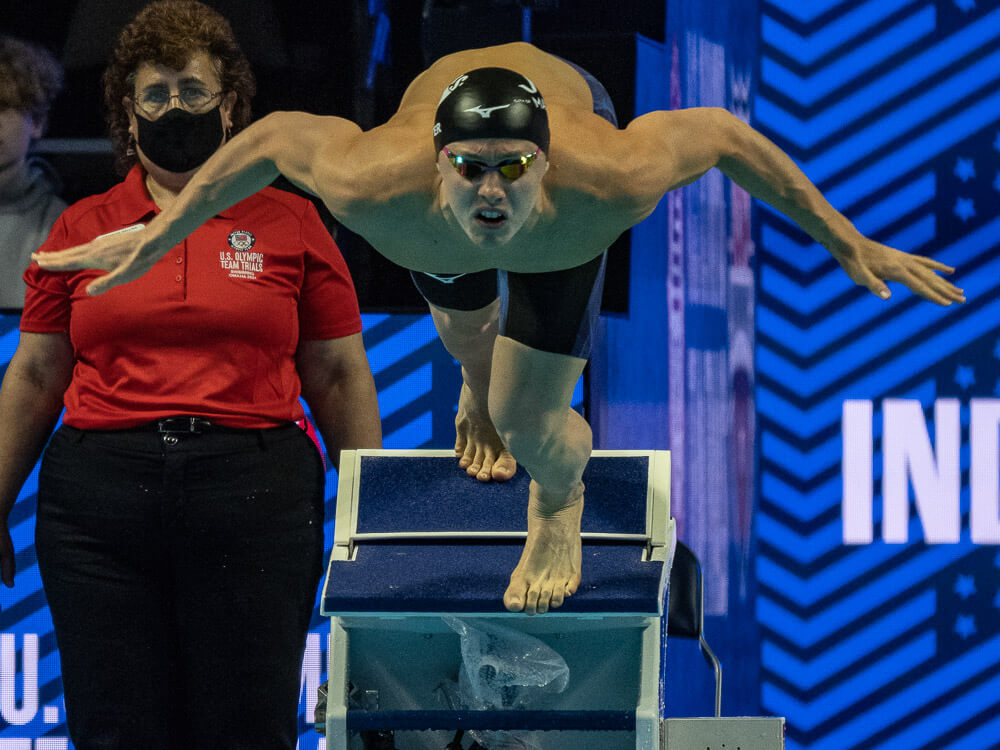
Editorial content for the 2022 NCAA DI Men's Swimming & Diving Championships coverage is sponsored by Swiss Timing.
See full event coverage.
Follow Swiss Timing on Instagram at @omega #OMEGAOfficialTimekeeper

NCAA Men’s Championships: Texas vs. Cal – Part 11; A Look At Top Matchups
The NCAA Men’s Championships will see Eddie Reese’s Texas Longhorns and Dave Durden’s California Golden Bears battling it out for the national title. No, you are not experiencing déjà vu. This just happens every single year — literally. Texas and Cal have been 1-2 in some order at the men’s championships every year since 2014 and every year except one since 2010. The outlier was in 2013, when Michigan won the meet, but Cal finished second and Texas third.
Reese announced his retirement two days after Texas won last year’s meet by just 27 points, but three months later, Reese decided to return as head coach in pursuit of a 16th national title. The 15 titles that Texas has won are the most by any school (Michigan is second with 12), while Reese’s 15 wins are four more than the second-highest total (Mike Peppe with 11).
Outside of the team race, there is plenty to watch in individual racing. With many top athletes back for an unprecedented fifth year, this will be the most experienced NCAA Championships ever, and nine members of the 2021 U.S. Olympic team are scheduled to be in action. With that in mind, here are the five storylines we are watching most closely.
1. Longhorns vs. Golden Bears
At the midseason Minnesota Invitational, Texas simply clobbered Cal. Sure, fifth-year standouts Trenton Julian, Hugo Gonzalez and Bryce Mefford were all absent, but Texas came out ahead on every relay, and Texas had suddenly developed new swimmers capable of making a huge impact on an already-championship-caliber team, including freshman freestyle Luke Hobson and graduate-transfer senior Cameron Auchinachie.
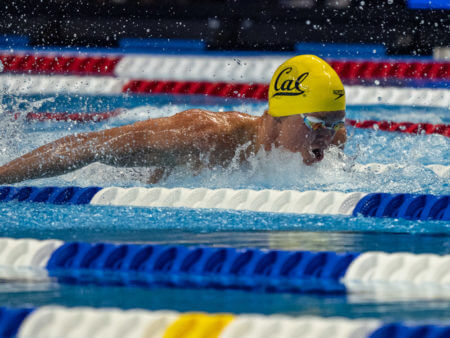
Cal’s Trenton Julian — Photo Courtesy: Peter H. Bick
Meanwhile, Cal was not performing its best, and that trend continued through the winter as Stanford upset the Bears in the teams’ final dual meet. The Pac-12 Championships didn’t start off much better, but suddenly, over the last two days of the conference meet, Cal looked like the best team in the country.
Outside of distance freestyle, Cal has no weak spots. Bjorn Seeliger is back for the sprints, and Reece Whitley has a shot at winning at least one national title in breaststroke. Julian is aiming to win an elusive NCAA title in the mid-distance freestyle or butterfly events. Coming off his first Olympic final, the versatile Gonzalez should be huge in the IMs and 200 breaststroke. Gabriel Jett could be the next instant-impact Cal freshman.
Then there is backstroke. Destin Lasco became the third-fastest man in history in the 200 back last season, and he’s the top seed and favorite for this year. Daniel Carr is the second seed in the event. Mefford, who was fourth in the 200-meter back at the Olympics, is also there. In the shorter 100 back, Seeliger, Lasco and Carr are all A-final threats.
Texas, meanwhile, counters with an established core of Carson Foster, Drew Kibler, Caspar Corbeau and Danny Krueger, with an excellent supporting cast of Hobson, Auchinachie, Jake Foster, Alvin Jiang, David Johnston, Braden Vines, Peter Larson and more.
Psych sheet projections show Cal with 358 swimming points and Texas just behind at 350. Florida, led by Olympians Kieran Smith and Bobby Finke, is the potential spoiler with a seeded 310. But the Bears and Longhorns have a track record of performing their best at this meet every single year, and there’s no reason to believe it will not happen again. Looking in particular at the relays, both teams have plenty of room to improve upon their seed times in those events, particularly Cal groups currently outside the top eight in both medley relays.
It’s worth noting that diving is often an X-factor for Texas, including last year when the Longhorns’ 83 points made the difference in the team race. Texas diver Jordan Windle has been suspended for most of this season, but the team does return two scorers from last year’s meet, Andrew Harness and Noah Duperre. Cal does not have divers competing.
2. Leon Marchand Against Carson Foster for IM Supremacy
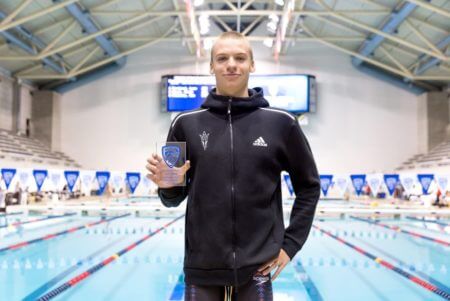
Arizona State’s Leon Marchand — Photo Courtesy: Arizona State University
At the 2021 U.S. Olympic Trials, Carson Foster led for the majority of the 400-meter IM final, and he was still in position to finish second and qualify for his first Olympics until the last 15 meters. He fell to third that night, but he returned in late July to post the world’s fastest time in the 400 IM, quicker than the mark Chase Kalisz swam on his way to Olympic gold. During the early part of his sophomore campaign at Texas, Foster looked to be on a mission as he recorded impressive performances at every opportunity.
But he will enter his second NCAAs seeded second in the 400-yard IM behind Leon Marchand, the native of France who placed sixth in the 400 IM in Tokyo. Marchand is also the top-seeded swimmer in the 200 IM as the only performer who has been under 1:40 this season, but it’s the showdown in the longer medley that is most intriguing. Marchand ranks second all-time in the event at 3:34.45, and Foster is third at 3:35.27. Certainly, Kalisz’s five-year-old U.S. Open record of 3:33.42 could be under siege here.
We should not forget the other major contenders here. Cal’s Hugo Gonzalez won the B-final of the 400 IM at NCAAs last year, and his time was actually quicker than the winning mark in the A-final. Gonzalez will be seeded third behind Marchand and Foster this season.
Then there’s Bobby Finke, best known for his magical Olympic-gold-medal-winning performances in the 800 and 1500-meter freestyle in Tokyo, but before he ran down Florian Wellbrock, Mykhailo Romanchuk and Gregorio Paltrinieri for Olympic gold, he won the 2021 NCAA title in the 400-yard IM in the same manner. He overcame a 1.5-second deficit on the final 100 yards of the 400 IM to run down and pass Foster. Finke is seeded 38th out of 41 swimmers in the event this year, but don’t let that fool you — he could absolutely be in the hunt to win this race again.
3. Pushing Boundaries in the 200 Freestyle
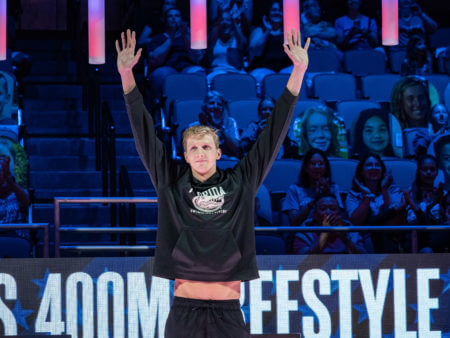
Florida’s Kieran Smith after qualifying for the 2021 Olympic team — Photo Courtesy: Peter H. Bick
The last time the NCAA Men’s Championships were in Atlanta, a Texas freshman named Townley Haas became the first man to ever break 1:30 in the 200 free. Two years after that, Indiana’s Blake Pieroni got under 1:30 for the first time, and Haas joined him in the 1:29 club a couple days later. Harvard’s Dean Farris blasted a 1:29.15 in the 2019, which still stands as the American record, while Florida’s Kieran Smith has also been sub-1:30.
We could certainly more men join that exclusive club this season. Arizona State’s Grant House is the top seed in the 200 free at 1:30.23 with Smith just behind at 1:30.42, while Georgia’s Matt Sates, LSU’s Brooks Curry and Indiana’s Rafael Miroslaw have been 1:31s previously. Additionally, the leadoff leg of the 800 free relay on Wednesday night provides a chance for fresh swimmers, including non-200 free specialists, to take a shot at quick times.
Farris is not swimming the 200 free at NCAAs, but Harvard does have an 800 free relay, so expect Farris to lead off and see if he can pop a huge performance. His 2019 American record, after all, was a relay leadoff. We’ll see if Drew Kibler and Patrick Callan, both U.S. Olympians in the 800 free relay last year, have big drops in store.
The favorite to win the NCAA title here is Smith, who proved himself on the international stage in Tokyo as he became the third-fastest American ever in the long course 200-meter free and the first since 2011 to swim under 1:45. Maybe he can take a shot at Farris’ impressive record. But in the meantime, it’s worth looking out for swimmers with the capabilities of translating fast 200 free performances into long course after the Americans missed out on a medal entirely in the 800 free relay in Tokyo.
4. Albiero, Julian, Urlando & Ivanov Square Off in 200 Butterfly
At the 2021 NCAA Men’s Championships, Cal’s Trenton Julian led Louisville’s Nick Albiero by seven tenths with 50 yards to go, but in an epic finish, Albiero surged past his rival to win by two tenths. Both were seniors at the time, so the race seemingly signaled the end of their college careers, but the NCAA’s COVID waiver allowed both to return for a fifth year. So here we go again.
At this year’s ACC Championships, Albiero became just the second man to ever break 1:38 in the 200 fly. Julian, meanwhile, had the lead in the 200-meter fly at Olympic Trials through 150 meters before he faded badly at the end. He went on to post the quickest time all year for the U.S. men in August, but when he competed in the 200 fly for the U.S. at the Short Course World Championships in December, Julian again faded badly on the last 50, dropping from first place to fourth. In this NCAA rematch, Julian will undoubtedly have the lead through 150 yards, but can he hold his stroke together this time?
Meanwhile, four others are entered with sub-1:40 performances. Georgia sophomore Luca Urlando will be gunning for his first NCAA title after he, too, had a near miss in the 200 fly at Olympic Trials. Urlando has actually been 1:53 in the long course version of the event. He accomplished that in 2019, but Urlando’s form this season has been his best in three years. Virginia Tech’s Antoni Ivanov was third in the event last year (one spot behind Julian and one ahead of Urlando), while Indiana’s Brendan Burns and Georgia’s Matt Sates are the other big names.
5. Who’s Next for Greatness?
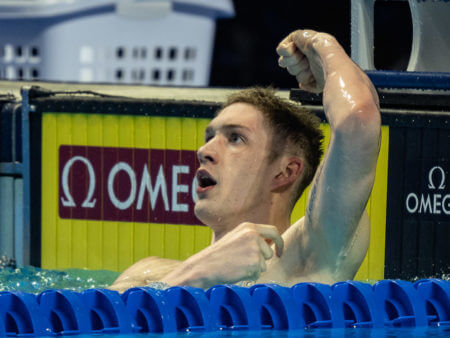
Ohio State’s Hunter Armstrong was a surprise qualifier for the U.S. Olympic team — Photo Courtesy: Peter H. Bick
Last season, swimmers like Kieran Smith and Bobby Finke translated their success on the college level into winning individual medals at the Tokyo Olympics. Drew Kibler, meanwhile, went from getting second at NCAAs to contributing to an 800 free relay squad in finals in Tokyo.
However, the other college swimmers to qualify for Tokyo had mixed results at the NCAA level. Cal’s Bryce Mefford took third in the 200 back in 2021, while LSU’s Brooks Curry was a three-time A-finalist. But Ohio State’s Hunter Armstrong, Indiana’s Michael Brinegar and Michigan teammates Patrick Callan and Jake Mitchell all finished outside the top eight in their individual swims in 2021 before going on to qualify for Tokyo a few months later.
Short course success is absolutely not a perfect predictor of long course success, although it is worth noting that some of those swimmers, particularly Armstrong and Curry, have come into their own on the college level this season. At the very least, keep an eye out for the underclassmen who do excel on this level as a possible sign of a future breakout on the national level.
Here are six contenders for a breakout meet among freshman: Tennessee’s Jordan Crooks, NC State’s David Curtiss, Penn’s Matt Fallon, Texas’ Luke Hobson, Cal’s Gabriel Jett and Indiana’s Josh Matheny. Crooks and Curtiss are seeded first and fourth, respectively, in the 50 freestyle, while Fallon and Matheny are both top-five seeds in the 200 breaststroke. Hobson and Jett have shown signs of being top-eight contenders in multiple events, and both swim for programs known for producing their best swims at this meet.




.png)